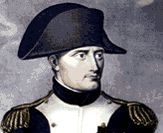 |
 |
 |
Napoleon Bonaparte (6)Emperor of France 12
Portraits of Napoleon Bonaparte
Appalling cold, lack of supplies and constant attacks by Russian forces whittled away the once-magnificent army so that when it finally stumbled out of Russia its survivors numbered fewer than 20,000. Seeing the French almost on their knees the revenge-seeking Prussians broke their alliance with Paris and, together with Sweden, joined the Tsar's campaign to kick the French out of Germany. The 1813 Campaign through Germany saw a weakened Bonaparte fight and win the battles of Lutzen, Bautzen and Dresden, but the sheer weight of numbers caught up with him at Leipzig, where some 200,000 Frenchmen took on 400,000 enemy troops in a massive three-day battle. Defeated, and his forces also facing an unbeaten and advancing British army in Spain, Bonaparte gathered strength for his last roll of the die - the battle for France. The following campaign saw Bonaparte return to his brilliant best and he won battle after battle with weak and inexperienced forces pitted against seasoned and seemingly innumerable enemies. Finally, however, the numbers told and he was forced to abdicate by his marshals on 6 April 1814. He gave a final farewell to his Old Guard at Fontainbleau on 20 April and chose 600 men to go into exile with him on Elba. On the island Bonaparte plotted his return and taking advantage of lax security and in the knowledge there was a growing resentment of the restored Bourbons and Louis XVIII, he landed in France in early March of 1815. Despite being branded an Enemy of Humanity by his enemies, the French people flocked to him and within months he had rebuilt his army for the expected arrival of the armies of Russia, Prussia, Austria, Sweden and Britain. Rather than wait he launched a lightning campaign into Belgium in the hope of catching the British, under the Duke of Wellington, and the Prussians, under Field Marshal Blucher, off guard. The plan worked, but a series of command errors by subordinates blew the opportunities offered and despite victory at Ligny and a tactical draw at Quatre Bras, he was defeated at Waterloo. Exiled a second time, the man who ruled Europe spent his last six years on a small island in the South Atlantic called St Helena. His death in 1821 brought relief to the royal houses of Europe and it was only in 1840 that his body was allowed to return to his beloved France.
|
||
|
Napoleon
Bonaparte
|
|
| Career | Portraits |
| Quotes | Family |
| Loves | Letters |
| Plots | Murdered? |
| His will | Places |
|
Era
of Napoleon
|
|
| Powers | Opponents |
| Coalitions | Allies |
| People | Timelines |
| Key sites | Shrapnel |
|
Warfare
|
|
| Campaigns | Battles |
| Armies | Generals |
| Marshals | Winners |
| Glossary | Medical |
| Weapons | 1812 War |
| Uniforms | Battlefields |
|
War
at Sea
|
|
| Naval War | Heroes |
| Artworks | Signals |
| Nelson | Trafalgar |
|
Maps
|
|
| Key Maps | Peninsula |
| Animated | 1796/1800 |
| 1809 | Russia |
|
French
Revolution
|
|
| Revolution | Guillotine |
| Posters | People |
|
Art,
Film, Games
|
|
| Education | Goya |
| Sharpe | Hornblower |
| Books | Movies |
| DVDs | Music |
| Wargames | Images |
| Cartoons | Caricatures |
|
Other
|
|
| About Us | Sources |
| Awards | Sitemap |
| Links | Militaria |
| Miniatures | Reenactors |
| Forum | Quizzes |
| Home | Waterloo Diorama |
|
Napoleonic
Auctions
|
|
| General | Miniatures |
| Militaria | |
 Still
hoping for peace negotiations, Bonaparte delayed leaving the capital
for too long and on his march back to France
Still
hoping for peace negotiations, Bonaparte delayed leaving the capital
for too long and on his march back to France